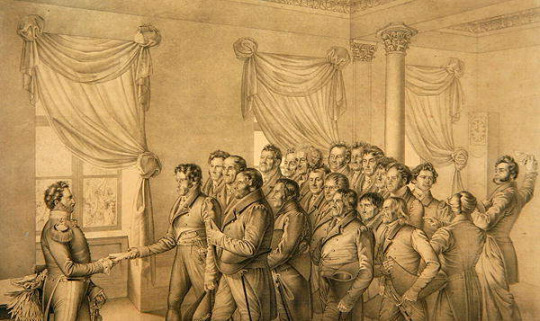#lustik
Explore tagged Tumblr posts
Text
I would not say that Jerome Bonaparte is like a historical blorbo of mine, nor that I really know too much about him, but it is nice to stumble over him in the wild. I always go "König Lustik?!" and I am delighted when it is indeed him.
#könig lustik is just such a good nickname and example of german/north hessian humour#god reminds me of my dad's work colleague they only call Super Mario#beablabbers#i was listening to a podcast about bonnie and clyde -> fbi was mentioned as rebranded -> i go to wikipedia for the history#and wouldn't ya know the fbi was founded by könig lustik's grandson
2 notes
·
View notes
Text






Big cosplay project we made 😎 What do you think?
Ph: Loiq
3D work: Luden
Editing: LustIk
#resident evil#re4 remake#resident evil 4#capcom#cosplay#ashley graham#leon s kennedy#leon scott kennedy#art
202 notes
·
View notes
Text
youtube
Oy Khanike oy Khanike
A yontef a sheyner,
A lustiker a freylekher
Nisht do nokh azoyner
Ale nakht mit dreydlekh shpiln mir,
Frishe heyse latkes, esn on a shir.
Geshvinder, tsindt kinder
Di Khanike likhtlekh on
Zogt “Al Hanisim” loybt Got far di nisim
Un lomir ale tantsn in kon.
Zogt “Al Hanisim” loybt Got far di nisim
Un lomir ale tantsn in kon.
18 notes
·
View notes
Text

Jerome Bonaparte was basically the first Napoleonic personality I got introduced to. Back in elementary school our class was walking through Kassel (the capital of Jerome's Kingdom of Westphalia) and our teachers pointed out a poster advertising an exhibition. They told us how there once lived a king in Kassel, however he wasn't a native German and it was said the only thing he knew how to say in German was 'Morgen wieder lustig' ('tomorrow funny again'), which earned him the nickname 'König Lustik' ('King Funny'). I didn't get interested in (Napoleonic) history until much, much later, but that (most likely not true) anecdote stuck with me ever since.
#jerome bonaparte#napoleonic era#napoleonic wars#historical art#hometown hero ... i guess#look this city doesnt have a lot going for it#my art
61 notes
·
View notes
Text
There are some parts of this fandom that definitely police what people are and are not allowed to say in a very similar way that cult leaders do
During my time in this fandom I have been doxxed, harassed, and sent death threats for having a difference of opinion
You always have to have a black sheep, someone to blame, someone to dislike, women especially take to this type of behavior like ducks to water; isolating, harassing, engaging in exclusionary tactics directed towards specific people that they wish to use as a punching bag for the entire group
The similarities between fandoms and cults is astounding, because at their core they are essentially the same thing
Here's a little information that might help people recognize the behaviors of certain people who can continually attempt to oppress freedom of personal expression and opinions
What Is a Cult? 10 Warning Signs
How to know when you or a loved one may be in a cult
By Amy Morin, LCSW Updated on November 13, 2023
Fact checked by Cara Lustik
How to Recognize a Cult
A cult is an organized group whose purpose is to dominate cult members through psychological manipulation and pressure strategies.1 Cults are usually headed by a powerful leader who isolates members from the rest of society.
Some individuals who join cults remain lifelong members. Others break free and share how it felt to be brainwashed by a charismatic leader. But there are also some individuals who leave a cult and report that their experience was positive.
Studying cults is difficult for a few different reasons. It’s nearly impossible to study active cult members due to their unwillingness to let others into their closed societies. Quite often, they are suspicious of outsiders.
Consequently, cults are usually examined from the perspective of former members. But sometimes, individuals are reluctant to talk about their experiences as cult members. For these reasons and others, it can even be tricky to agree on a solid definition of a cult, especially given many of the stereotypes presented in film, TV, and other media. Not all cults have to be high profile groups that make headlines.
How to Recognize a Cult
Sometimes individuals disagree about whether a group, such as a certain religious group, is actually a cult. Even researchers sometimes can’t agree on what constitutes a cult.
Most people can agree that cults have a leader. And the leader (or group of people who serve as leaders) is responsible for the rules that guide the members.
According to the Cult Education Institute, there are specific warning signs to look out for when considering whether a group might be a cult. Cults are characterized by:2
Absolute authoritarianism without accountability
Zero tolerance for criticism or questions
Lack of meaningful financial disclosure regarding budget
Unreasonable fears about the outside world that often involve evil conspiracies and persecutions
A belief that former followers are always wrong for leaving and there is never a legitimate reason for anyone else to leave
Abuse of members
Records, books, articles, or programs documenting the abuses of the leader or group
Followers feeling they are never able to be “good enough”
A belief that the leader is right at all times
A belief that the leader is the exclusive means of knowing “truth” or giving validation
Cults are dangerous because they typically rely on deceptive and authoritarian practices to make members dependent on and obedient to the group. Cults often cut members off from other forms of social and financial support and pose both physical and psychological risks to members of the group.1
Why People Join Cults
To those on the outside, it can be difficult to understand why anyone would join a cult. Researchers have found that there are several reasons why individuals may join.
They Don't Know They're Joining a Cult
Most individuals don’t recognize the group they’re joining is considered a cult. Individuals who are attracted to groups that are considered cults may have certain vulnerabilities that make them more likely to join, such as anxiety or substance abuse problems.1
They Have Unresolved Insecurities
Another study found that many cult members experience attachment insecurity prior to joining a cult. Their insecurities may drive them toward a group that promises acceptance.3
Once they join a group, they’re usually distanced from outside influences. After people are separated from the outside world, leaving the group becomes difficult. They often grow dependent on being in the group and develop suspicions of anyone outside the group.
This is why some people suspect that cult members are “brainwashed.” And there is some science behind this idea, as members are often told they’re being persecuted by people outside the group.4
They Are Manipulated Into Joining
The other major theory about why individuals remain in cults is mostly sociological.1 Cult leaders often promise to reward members in some way. They may tell them they’re going to move up the ranks within the cult or they may convince them that something really good is going to happen to their special group.
Some people believe those involved are more like “victims” rather than “members,” since they are often subjected to psychological manipulation tactics that lure them into making unhealthy decisions—including suicide in some cases.
Getting out of a cult can be quite difficult. Some members don't have contact with the outside world, so it can be nearly impossible to get help. Others don't have financial resources to find a new place to go.
Famous Examples of Cults
Why people become cult leaders is also not well understood. Some experts suggest that most cult leaders tend to be psychopaths. They are often charismatic and use psychological tactics to gain power, social control, and allegiance from their followers.5
There have been many cults that have made the news—quite often for their tragic endings.
Charles Manson
In the 1960s, Charles Manson assembled a group of young people and referred to them as his family. Manson expressed his ideas about an imminent race war and he told his followers he wanted them to go on a killing spree.6
One night in 1969, several followers murdered five people, including actress Sharon Tate. Manson was later convicted of first-degree murder.
Jim Jones
Jim Jones founded The People’s Temple in Indianapolis in 1955. He moved his followers to Eureka, California out of fear that a nuclear attack might strike Indiana. He later moved his followers to Guyana, to an area which became known as Jonestown.
An official went to investigate the group in 1978 after the government grew concerned that some members were being abused.
The group shot and killed the official. Jones then instructed his followers to drink Flavor Aid laced with cyanide. Over 900 people died, including Jones—who was found with a bullet wound to the head.
Heaven’s Gate
Heaven's Gate was a group that started in the 1970s. It was known as a "UFO religious" cult. The tightly knit group required members to give up almost all of their possessions.
In March of 1997, 39 members put on matching dark clothes, ingested barbiturates, and placed plastic bags over their heads and killed themselves. This was one of the largest mass suicides in United States’ history.
David Koresh
David Koresh thought he could have conversations with God and he convinced his followers the world was ending. He and more than 100 people moved to a compound outside of Waco, Texas.
The FBI tried to arrest Koresh in 1993 because of violations of the law—such as advocating for underage girls to marry adult men. This led to a 51-day standoff. Ultimately, 75 people from the group died. Like Jim Jones, Koresh was found dead with a gunshot wound to the head.
Takeaway
If you grew up in a cult or you recently got out of one, you may want to talk to a mental health professional about the complex feelings you may have. Whether you were exposed to traumatic events or you are confused about your identity, there are many reasons why talking to someone might help you.
If you think a friend or family member may be involved with a cult, that can be really scary too. Reach out for professional help to get some guidance on what you can do or how you can cope with your emotions. It's going to take time, understanding, and a lot of patience to help extricate your loved one if they are in a dangerous situation.
6 Sources
Amy Morin
By Amy Morin, LCSW
Amy Morin, LCSW, is a psychotherapist and international bestselling author. Her books, including "13 Things Mentally Strong People Don't Do," have been translated into more than 40 languages. Her TEDx talk, "The Secret of Becoming Mentally Strong," is one of the most viewed talks of all time
Verywell Mind's content is for informational and educational purposes only. Our website is not intended to be a substitute for professional medical advice, diagnosis, or treatment.
Ⓒ 2025 Dotdash Media, Inc. — All rights reserved
Verywell Mind is part of the Dotdash Meredith publishing family.
0 notes
Photo










Life / 2018
Akif Kaynar
https://www.behance.net/gallery/72580247/Life
#Illustration#drawing#artwork#art#akifkaynar#road#mountain#existence#slide#being#life#khrishnamurti#lustik#itscolossal#nevver
8 notes
·
View notes
Note
6 katsudeku
6. the way you said i love you: on a sunny tuesday afternoon, the late sunlight glowing in your hair
There are some people, Bakugou realizes, that are just too damn good-looking—and Midoriya Izuku happens to be one of them.
Bakugou knows that no one ever expects him to be the observant, intelligent type (screw those people), and most of the time, he isn’t. Fights and training are really the main exception to that. But with someone like Izuku, it’s hard for him to not stare out of the corner of his eye, when he thinks no one is looking.
It’s a sunny, Tuesday afternoon when Bakugou finds himself staring again.
The weather is warm, but not too warm that it’s uncomfortable, and a soft breeze rustles the cherry blossom trees surrounding the park. Pink petals fall to the ground at Bakugou’s feet, but he kicks them away, leaning back on the wooden bench he sits on.
Sunlight washes over Izuku, who stands a few yards away, talking to Four-Eyes and Round Face. It casts a glow across his cheeks, making his freckles stand out; Bakugou wants to rub them away.
Izuku’s hair, curly and thick and soft, turns different shades of green as the light shines through the strands. One moment, it’s a simple, dark green; Bakugou tilts his head slightly, and it turns into emeralds. The next, it’s a forest.
Bakugou hates it. He hates Deku, he hates his hair, he hates his freckles.
Most of all, Bakugou hates himself.
He hates that he notices every little thing about Deku, from the scars and calluses on his hands to the way the corners of his eyes crinkle up when he smiles.
I hate you, Bakugou thinks, reaching down to pick up a handful of petals from the ground. He clutches them in his fist, enclosing his fingers around them, and when he releases, the blossoms are long gone. Only a pile of soot and ash remains.
Bakugou knows, as much as he wishes he doesn’t, what he really means.
I love you, he thinks bitterly. I love you, I love you, I-
“Kacchan?”
He jerks his head up. “The hell do you want, Deku?”
“Um, nothing! I just saw you staring at us, and I thought, uh, maybe something was wrong?” Izuku scratches the back of his neck nervously.
“That’s not all!” Uraraka chimes in. “We heard you muttering something over and over, Bakugou, it kinda sounded like you were saying-”
“Shut your mouth!” Bakugou roars, raising his palm so sparks fly in Uraraka’s face. She jumps back, narrowly dodging what could have been a singed nose.
“I don’t mutter. I’m not fucking Deku,” Bakugou scowls, standing up from the park bench.
“Actually, Bakugou, there is a large difference between muttering and mumbling!” Iida corrects him. “You see, muttering is when you say something under your breath, and mumbling is-”
“Like I care,” Bakugou says over his shoulder. He walks away, staring at the ground and his footsteps.
He decides one thing, right then and there—Izuku can never catch him staring again.
#ask#lustik-chan#request#why did I write this in present-tense#who knows#katsudeku#bakudeku#bnha#bakugou katsuki#midoriya izuku#bakugou#mine#bnha works#my works#my writing#katsudeku fic
83 notes
·
View notes
Text

Todd Fuller. lustik via mysharona1987
10 notes
·
View notes
Note
13 for the ask game!
Finally getting around to clearing out my inbox! Thank you SO much for asking!
History Ask Game
13. [share some random historical trivia!]
OOOOUUUHHH, where to START!
I have to learn more about Frederick II. of the HRE, he is my second favourite swabian (first is my friend Jani, third is Felix Fabri). Because what I do know FUCKS SO HARD, aside from the fact that he was a rip-roaring BANG to end one periodization phase of the German Medieval ages. You basically killed your entire dynasty, but by GOD did you do it while serving CUNT.
My favourite story is the crusade one, the abridged version. So, my boy Fritz had sworn to the Pope that he'd go on crusade some time, but you know, always something better to do when you're the emperor and also King of Sicily. By the time Fritz can finally go, he gets violently sick on the boat that just left Brindisi and goes back home. That's not a good enough excuse for the Pope, who excommunicates him anyways, so Fritz says oh FUCK YOU, I'm going anyways. Goes to the Holy Land, brokers a temporary peace with the local muslim elite and gets to ACTUALLY go to Jerusalem. Absolute king shit, all while excommunicated. I know it's medieval Europe, he probably did some horrendous shit I haven't read up on yet, but he is my favourite. The balls on this man and his love for South Italy which I share. I visited his grave when I was in Palermo, it was ALL I saw of the Cathedral that time around (I will return. And probably look at Fritz again as well as the rest.)
Time Jump! During the Napoleonic occupation, Kassel (the capital of the Landgraviate Hessen-Kassel) became the capital of the newly formed Kingdom of Westphalia and was ruled over by Napoleon's brother Jerome. Or how the Kasseläner_innen called him - König Lustik. Because the only sentence in German he, according to the local tradition, was "Morgen wird wieder lustig" - "Tomorrow, we'll have fun again" (Or to make merry ... It's hard to translate). Also, after Napoleon was defeated and the Landgraf, now Kurfürst Wilhelm I. (Vienna Congress shenanigans, don't worry about it), returned ... they weren't so keen on his absolutistic leanings? So, in 1830, when riots broke out, citizens successfully pressed Wilhelm II to call together the Landtag (not parliament, but a representation of all the people with power in the principality's realm. The estates of a principality, you get it). He did call it together, something that hadn't been done in a long time because absolutism, and they got a constituition, to enshrine rights for citizens and curb the monarchical power! There's a big cutout reproduction in the Kasseler Stadtmuseum of an engraved illustration by Ludwig Emil Grimm! Here's the entire engraving!

Grimm you may now think ... Grimm like the Brother Grimm? Indeed! He was their youngest brother, with Wilhelm and Jakob being the eldest of six children! He was a famous illustrator and also illustrated copies of his brother's Kinder- und Hausmärchen. The city of Kassel was home to the family for many, many years, with Jakob and Wilhelm studying in nearby Marburg as well. One of the reasons that a lot of 'their' fairytales have French origins is the fact that Kassel took in huge swaths of Huguenots over the course of the 17th and 18th century. They let them settle around the Landgraviate (name for a principality ruled over by the Landgraf, in German Landgrafschaft), in existing places as well as newly founded settlements. That's why there is a small village in East Hesse named Gethsemane, called Getzemich in the local dialect. Of course, named after the garden in Jerusalem in the bible. And because those Huguenots were very industrial and Jakob & Wilhelm weren't really gonna leave their cushy study, lots of middle class Huguenots came to tell them their tales - hence things they had carried with them from France.
I am so sorry, this was so much and I could talk on and on and on about Hessian history, I could dig up funfacts about Sicily or other South Italian places, I could wreck my brain for some ancient Roman or Mesopotamian funfacts, I could even unearth some about Ireland and Great Britain if I dug deep enough. I just ... I love history. It's fascinating. It's all there ever was in human history! It's entirely different cultures from our own and yet many times the answer why things are the way they are today! It's the past, it's the present and we look to it because we ask about the future. Wonderful, isn't it?
#beareplies#history#callidaiunctura#SORRY I GOT CARRIED AWAY I HAD TO ACTUALLY GOOGLE QUITE SOME STUFF FOR THIS#also I haaave to see Grimm. Ein deutsches Märchen a second time that was so much fun#holy moly empire#haughty hessians#yes they get their own hohi style historic category tag. I'll probably need it
5 notes
·
View notes
Photo

jordi alcaraz
https://lustik.tumblr.com/post/103184719402/jordi-alcaraz-via-boek-visual-lustik-twitter
60 notes
·
View notes
Photo

Trim. The investigator, 2019 - Todd Fuller.
via Lustik
56 notes
·
View notes
Text

#illustration#artwork#akifkaynar#drawing#art#mood#illustrationartists#poster#comics#behance#nevver#lustik#photoshop#tumblr#post#newpost
1 note
·
View note
Photo





Imaginative Insects Formed From Resin and Brass by Hiroshi Shinno
Japanese artist Hiroshi Shinno builds hyperrealistic sculptures of insects that don’t exist, perfect forms of imaginative species that look as if they were built from vibrant leaves and delicate flower petals. Even these aspects of the creatures are false, as each leaf or petal was cast from resin and painted with acrylic paint before being placed on the model’s brass base.
In addition to building these fantastical works, Shinno also sketches the initial ideas for his imaginative creatures in an Insect Diary on his website. You can see more of the Kyoto-born artist’s insect-based sculptures and 3D work on his Tumblr. (via Lustik)
> thisiscolossal.com
2K notes
·
View notes
Note
I wanna say a million things but the only thing that leaves my mouth is : thank you
AW you’re veryyy welcome!! that makes me real happy to hear 💓
3 notes
·
View notes
Video
instagram
#dresden #nächstehaltestelle #altmark #altmarktdresden #kinder #lustik #spaß
0 notes
